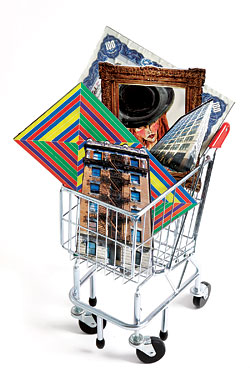 |
(Photo: Hannah Whitaker) |
The world, in case you haven’t noticed, is on sale. As with the stock market, which stands at roughly half its peak value, 50 percent off is a decent rule of thumb. Some things aren’t there yet, and may never be; a few things, like designer-knockoff handbags, have slipped into minus-90 territory. An incredible deal for someone.
If you happen to think that the cost of goods will eventually go back up, then some sale items aren’t just discounted—they’re undervalued. But what are they worth? A free market, by its very nature, assigns prices based on what other people think. But for many goods, that system is currently busted. People have shut down; the market is having a difficult time determining how anything should be priced. In an environment like this, you need to rely on your own sense of value. How much cash do you have on hand? What do you really want? How much risk are you willing to tolerate? Patience right now is your friend, as is the tactical lowball offer.
As much as prices have fallen, they could still fall a good deal further. The current condition is called deflation, which can be a self-reinforcing cycle: If everybody puts off buying something today because we’re all pretty sure it’s going to be cheaper tomorrow, we’ll all end up being right. But deflation won’t last forever. In fact, with all the government efforts to boost consumption, many economists believe that deflation will turn sharply into inflation, which means the last thing you’ll want on your hands is cash. You’ll want to have stuff that holds value.
Of course, if you could time this switch perfectly, you certainly wouldn’t need us. But don’t expect us to know, either. We wouldn’t dare predict the bottom, and if you feel you need to know you’re at the lowest point before you enter the market, please skip these pages. In this issue, we have focused on three areas—real estate, financial products, and art—in which investors have historically been able to make windfall profits by courageously buying in depressed markets. We canvassed experts for their advice on what presently discounted big-ticket items might be good investments in the long haul. Maybe, after years of renting, you’re flirting with becoming a first-time buyer. Maybe you happen to have some money in a mattress—or just won the lottery—and it’s worth thinking about a house in Bridgehampton (where median prices dropped 30 percent last year) or the Eric Fischl on auction next month (whose estimate tops out at $1.2 million, even though a similar work sold for $1.9 three years ago). These kinds of investments are not like scoring a heavily marked-down sweater at Barneys or a new car for five grand off and zero-percent financing. But the feeling can be the same—that you are walking out with a good deal. Maybe not the best deal, but you got something you’ll enjoy owning for a while, which, after all, is the true meaning of value.
- REAL ESTATE
- FINANCE
